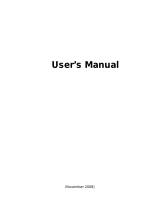
iii
Chapter 7 Care and Maintenance ................................................... 66
Protecting the Computer ......................................................... 67
Using an Anti-Virus Strategy ............................................... 67
Using the Cable Lock ........................................................... 67
Taking Care of the Computer ................................................. 68
Location Guidelines ............................................................. 68
General Guidelines .............................................................. 68
Cleaning Guidelines ............................................................. 69
Battery Pack Guidelines ....................................................... 69
Touchscreen Guidelines ....................................................... 71
When Traveling ........................................................................ 72
Chapter 8 Troubleshooting ............................................................. 73
Preliminary Checklist ................................................................ 74
Solving Common Problems ...................................................... 75
Battery Problems ................................................................. 75
Bluetooth Problems ............................................................. 75
Display Problems .................................................................. 76
DVD Drive Problems ............................................................ 76
Hardware Device Problems ................................................. 77
Hard Disk Drive Problems .................................................... 77
Keyboard and Touchpad Problems .................................... 78
LAN Problems ....................................................................... 78
Power Management Problems ........................................... 79
Software Problems .............................................................. 79
Sound Problems ................................................................... 79
Startup Problems ................................................................. 80
WLAN Problems ................................................................... 80
Other Problems .................................................................... 82
Resetting the Computer .......................................................... 83
System Recovery ....................................................................... 84
Using Windows RE ............................................................... 84
Using Recovery Partition ..................................................... 85
Using the Driver Disc ................................................................ 86
Appendix A Specifications ................................................................. 87
Appendix B Regulatory Information ................................................. 89
On the Use of the System ....................................................... 90
Class B Regulations .............................................................. 90
Safety Notices ....................................................................... 91
On the Use of the RF Device.................................................... 95
USA and Canada Safety Requirements and Notices .......... 95























